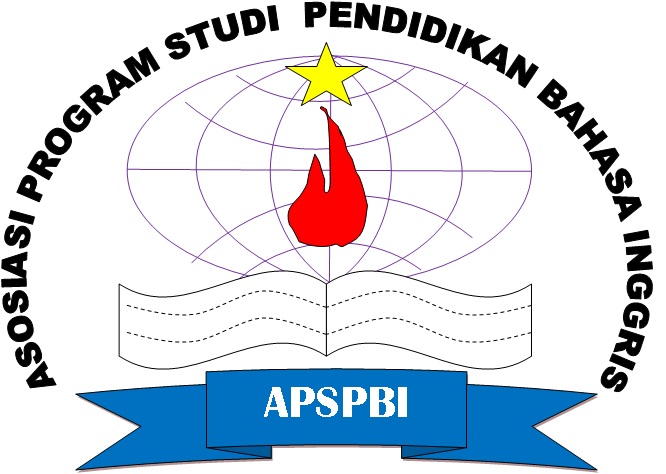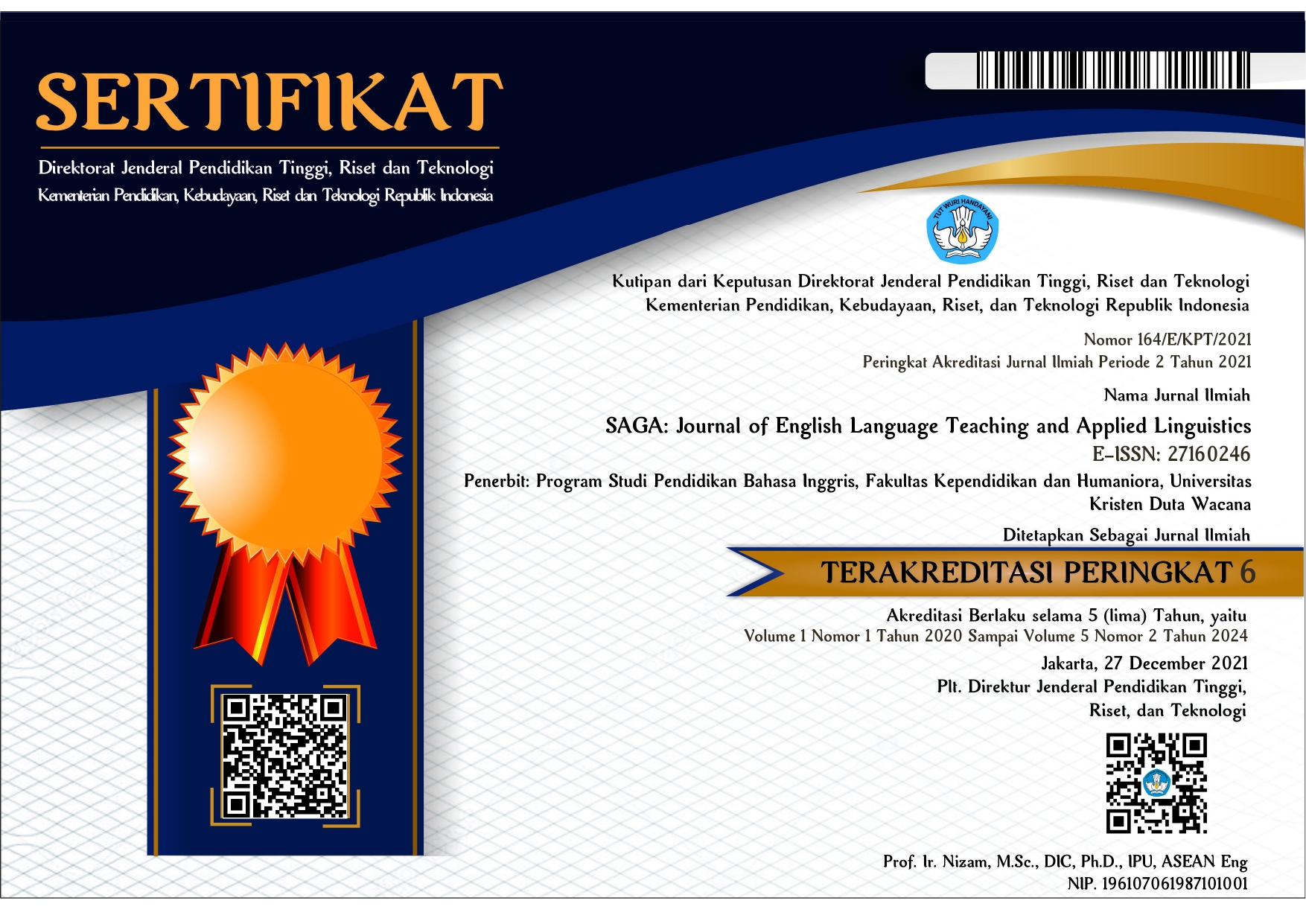ESP Students’ Self-Reflection on English Speaking Anxiety: An Investigation on Gender’s Perspectives
DOI:
https://doi.org/10.21460/saga.2024.52.210Keywords:
ESP; gender; self-reflection; speaking anxietyAbstract
Speaking in a foreign language becomes a challenge for many students, including ESP students. In ESP class, the students learn English for specific context related to the professional fields. Thus, having anxiety in the English class could affect their future performance in their future job. The current study seeks for insight on identifying speaking anxiety awareness among ESP students through self-reflection. The students are required to describe on of the tourist attraction in front of the class and have a self-reflection on their performance. With the total of 15 male and 15 female students, the study applied a qualitative study with case study design. The data were collected through classroom observation, questionnaires, and interview. The data were triangulated and analyzed through data condensation, data display, and conclusion drawing. As a result, the male students tend to have speaking anxiety than the female students. Based on the male students’ perceptions, pronunciation difficulty, lack of grammar comprehension, lack of vocabulary mastery, and lack of confidence become the cause of the speaking anxiety, while the female students have lack of practice, nervousness, and pronunciation difficulty as the problem. Thus, it is suggested the English lecturer to provide more practice on language system, such as grammar, vocabulary, and pronunciation to shape students’ comprehensibility on English. Also, the ESP students need to have extensive speaking practice to boost their confidence in speaking in front of the class.
References
Abdalgane, M. (2022). English Language and Globalization (An Analysis of Johnson against the Backdrop of ESL/EFL Learners) International Journal of Innovations in TESOL and Applied Linguistics English Language and Globalization. August. https://www.researchgate.net/publication/364623340
Akramy, S. A. (2020). Speaking anxiety in an Afghan EFL setting: A case study of an Afghan university. Language in India, 20(12), 161–182.
Al-Khotaba, H. A. H., Alkhataba, E. H. A., Abdul-Hamid, S., & Bashir, I. (2019). Foreign language speaking anxiety: A psycholinguistic barrier affecting speaking achievement of Saudi EFL learners. Arab World English Journal, 10(4), 313–329. https://doi.org/10.24093/awej/vol10no4.23
Almira, D., Rachmawati, E., & Faridah, D. (2018). EFL male and female students’ perception on speaking anxiety in class-oral presentations. Journal of Applied Linguistics and Literacy, 2(2), 56–70. https://jurnal.unigal.ac.id/index.php/jall/index
Alzamil, A. (2022). Situation-specific speaking anxiety: University-level students’ experiences. International Journal of English Linguistics, 12(2), 18–24. https://doi.org/10.5539/ijel.v12n2p18
Andriani, R., & Subekti, A. S. (2022). Indonesian pre-service English teachers’ teaching anxiety in teaching English for Occupational Purposes classes. Jurnal Pendidikan: Teori, Penelitian, Dan Pengembangan, 7(11), 533–543. https://doi.org/10.17977/jptpp.v7i11.17320
Anzanni, S., & Dewi, D. N. (2022). The correlation between vocational students’ speaking anxiety and speaking performances in learning English. IDEAS: Journal on English Language Teaching and Learning, Linguistics and Literature, 10(2), 1849–1862. https://doi.org/10.24256/ideas.v10i2.3148
Ayuni, N. L. C., Sulistia Dewi, N. L. P. E., & Paramartha, A. A. G. Y. (2021). The correlation between English language education students’ speaking anxiety and their speaking fluency. Jurnal Pendidikan Dan Pengajaran, 54(2), 337–345. https://doi.org/10.23887/jpp.v54i2.28474
Ayuningtyas, P. (2020). An exploration of anxiety towards English for specific purposes (ESP). Tell: Teaching of English Language and Literature, 8(1), 7–18. https://doi.org/10.30651/tell.v8i1.4327
Bahrudin, H., & Amir, Z. (2018). The relationship between personality traits and English language speaking anxiety among Faculty of Economics and Management undergraduates in UKM. Jurnal Wacana Sarjana, 2(4), 1–17. https://spaj.ukm.my/jws/index.php/jws/article/view/179
Batubara, M. D., Husain, B., & Makatika, G. (2022). The correlation between EFL students’ self-confidence and English speaking anxiety of Pasifik Morotai university. AL-ISHLAH: Jurnal Pendidikan, 14(2), 2401–2410. https://doi.org/10.35445/alishlah.v14i2.1475
Bekteshi, E., & Xhaferi, B. (2020). An analysis of English for specific purposes among university students. Educational Process: International Journal, 9(2), 90–102. https://doi.org/10.22521/edupij.2020.92.2
Boustani, K. (2019). The correlation between translation equivalence, as a vocabulary learning strategy, and Tunisian EFL learners’ speaking anxiety. Languages, 4(19), 1–24. https://doi.org/10.3390/languages4010019
Coppinger, L., & Sheridan, S. (2022). Accent anxiety: An exploration of non-native accent as a source of speaking anxiety among English as a foreign language (EFL) students. Journal for the Psychology of Language Learning, 4(2), 1–20. https://doi.org/10.52598/jpll/4/2/6
Damayanti, M. E., & Listyani, L. (2020). An analysis of students’ speaking anxiety in academic speaking class. English Language Teaching and Research Journal, 4(2), 152–170. https://doi.org/10.37147/eltr.2020.040206
El-Badri, H., & Abu-Baker, F. (2021). Learners’ perceptions of the effectiveness of using self-reflection to understand English literary texts: towards an autonomous learning approach in Libya. Journal of Learning Development in Higher Education, 21, 1–20. https://doi.org/10.47408/jldhe.vi21.615
Elmenfi, F., & Gaibani, A. (2016). Age as an affective factor in influencing public speaking anxiety of English language learners at Omar Al-Mukhtar university. Advances in Language and Literary Studies, 7(2), 496–505. https://doi.org/10.7575/aiac.alls.v.7n.2p.179
Fathikasari, N., Gozali, A., & Ratri, D. P. (2022). Public speaking anxiety of university students in EFL context. Journal of Education, Teaching, and Learning, 7, 40–44. https://dx.doi.org/10.26737/jetl.v7i1.2741
Glory, K. M., & Subekti, A. S. (2021). Indonesian high school learners’ fear of negative evaluation and ought-to L2 self. Langkawi: Journal of The Association for Arabic and English, 7(2), 157–169.
Glory, K. M., & Subekti, A. S. (2022). Fear of negative evaluation factors from ought-to L2 self among Indonesian high school EFL learners. Pedagogy: Journal of English Language Teaching, 10(1), 25–37. https://doi.org/10.32332/joelt.v10i1.4536
Goram, S. G., & Subekti, A. S. (2022). Role-play and speaking anxiety: A case study in an online English speaking class. JLA (Jurnal Lingua Applicata), 6(1), 33–43. https://doi.org/10.22146/jla.75103
Han, L., & Md Yusof, M. A. (2019). Students’ Self-reflections of Own Participation in English Language Oral Class. LSP International Journal, 6(2). https://doi.org/10.11113/lspi.v6n2.92
Irawan, R., Warni, S., & Wijirahayu, S. (2018). EFL learners’ speaking anxiet in an EOP program. Journal of ELT Research, 3(2), 193–203. https://doi.org/10.22236/JER
Jihan, & Hendriwanto. (2021). University students’ reflection on learning English through drama. Borneo Educational Journal (Borju), 3(1), 1–7. https://doi.org/10.24903/bej.v3i1.705
Long, K. L. Y., Yih, Y. J., & Lin, S. S. P. (2019). Undergraduates’ speaking anxiety in English as second language (ESL) classrooms. International Journal of Service Management and Sustainability, 4(1), 25–40. https://doi.org/10.24191/ijsms.v4i1.8180
Merriam, S. B., & Tisdell, E. J. (2016). Qualitative research and case study applications in education: Six Common Research Designs. San Francisco: John Wiley and Sons., 2, 1–38.
Miles, M. B., Huberman, A. M., & Saldana, J. (2014). Qualitative Data Analysis. Sage Publications. https://doi.org/10.7748/ns.30.25.33.s40
Miskam, N. N., & Saidalvi, A. (2018). Factors affecting undergraduates’ English language speaking anxiety. International Journal of English and Education, 7(4), 15–28. https://www.researchgate.net/publication/344486703_FACTORS_AFFECTING_UNDERGRADUATES'_ENGLISH_LANGUAGE_SPEAKING_ANXIETY
Miskam, N. N., & Saidalvi, A. (2019). Investigating English language speaking anxiety among Malaysian undergraduate learners. Asian Social Science, 15(1), 1–7. https://doi.org/10.5539/ass.v15n1p1
Mohtasham, L., & Farnia, M. (2017). English speaking anxiety: A study of the effect of gender on Iranian EFL university students’ perceptions. International Journal of Research in English Education, 2(4), 66–79. https://doi.org/10.29252/ijree.2.4.66
Mouhoubi-Messadh, C., & Khaldi, K. (2022). Dealing with foreign language speaking anxiety: What every language teacher should know. Training, Language and Culture, 6(1), 20–32. https://doi.org/10.22363/2521-442X-2022-6-1-20-32
Muslem, A., Fata, I. A., & Inayatullah, I. (2019). Factors affecting internship students’ speaking anxiety. Al-Ta Lim Journal, 26(2), 204–212. https://doi.org/10.15548/jt.v26i2.531
Pontillas, M., & Talaue, F. (2021). Levels of oral communication skills and speaking anxiety of educators in a polytechnic college in the Philippines. Journal of Education, Management and Development Studies, 1(1), 24–32. https://doi.org/10.52631/jemds.v1i1.15
Rabbani, B. H., & Sulistyaningrum, S. D. (2022). Using self-reflection in listening skills English proficiency for teacher course through web source. The 3rd Online National Seminar on English Linguistics and Literature (ELLit) 2022, 137–145. https://proceeding.unnes.ac.id/ELLit/article/view/1650
Salmani-nodoushan, M. A. (2020). English for specific purposes: Traditions, trends, directions. Studies in English Language and Education, 7(1), 247–268. https://jurnal.usk.ac.id/SiELE/article/view/16342Andriani, R., & Subekti, A. S. (2022). Indonesian pre-service English teachers’ teaching anxiety in teaching English for Occupational Purposes classes. Jurnal Pendidikan: Teori, Penelitian, Dan Pengembangan, 7(11), 533–543. https://doi.org/10.17977/jptpp.v7i11.17320
Subekti, A. S. (2018). An exploration of foreign language anxiety in the Indonesian university context: Learners’ and teachers’ voices. TEFLIN Journal, 29(2), 219–244. https://journal.teflin.org/index.php/journal/article/view/590
Subekti, A. S. (2022). L2 learning online: Self-directed learning and gender influence in Indonesian university students. Journal of English Educators Society, 7(1), 10–17. https://doi.org/10.21070/jees.v7i1.1427
Subekti, A. S., Kurniawati, L. A., Arrang, J. R. T. L., & Tulaktondok, L. (2024). Pronunciation anxiety of Indonesian pre-service English teachers: Do study duration and gender matter? Applied Research on English Language, 13(2), 105–124. https://doi.org/10.22108/are.2024.140500.2224
Suwartono, T. (2024). Globalization and college students’ attitudes towards learning English in an Indonesian context. Acta Pedagogia Asiana, 3(1), 23–29. https://doi.org/10.53623/apga.v3i1.330
Toubot, A. M., Hock Seng, G., & Binti Atan Abdullah, A. (2018). Examining levels and factors of speaking anxiety among EFL Libyan English undergraduate students. International Journal of Applied Linguistics and English Literature, 7(5), 47. https://doi.org/10.7575/aiac.ijalel.v.7n.5p.47
Widarni, W. (2023). Analyzing students’ self-reflection on project-based learning and caption text. Journal of English Education and Teaching, 7(1), 78–96. https://doi.org/10.33369/jeet.7.1.78-96
Wilang, J. D., & Vo, T. D. (2018). The complexity of speaking anxiety in a graduate EFL classroom. Journal of Asia TEFL, 15(3), 682–699. https://doi.org/10.18823/asiatefl.2018.15.8.682
















